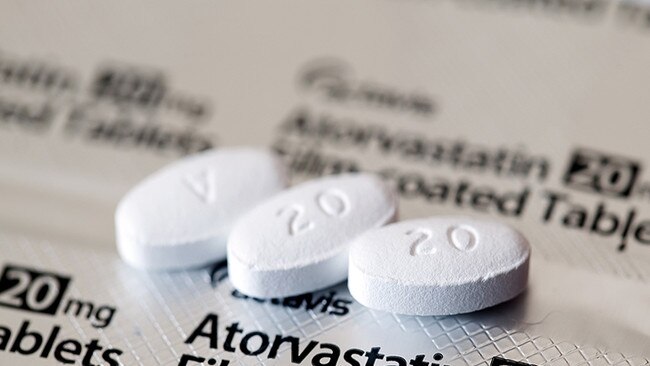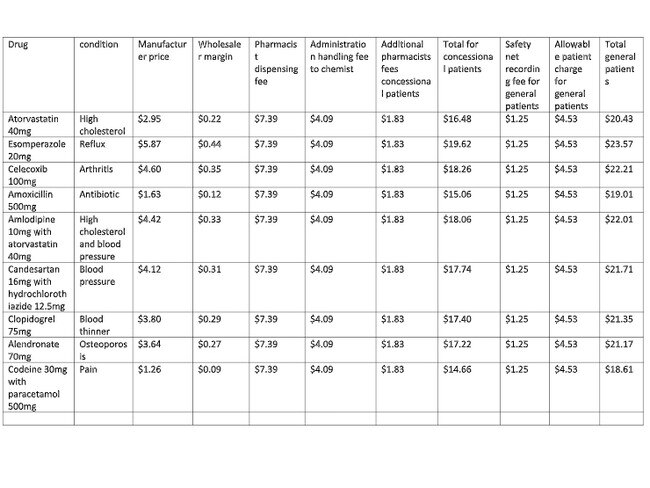How a powerful lobby group is pushing up PBS medicine prices
Aussies are being forced to pay up to six times more for vital medicines despite being listed on the PBS. This is how their cost is increased.
Health
Don't miss out on the headlines from Health. Followed categories will be added to My News.
Exclusive: Australia’s drug subsidy scheme is actually inflating the price of many common medicines an astounding News Corp investigation has found.
The hefty dispensing, administration and handling fees paid to chemists to stick a label on drugs are in some cases five to six times the cost of the medicines they are dispensing.
The scheme is pushing up the price of hundreds of medicines and we have provided a table showing how it affects nine common pills.
The most prescribed pill in Australia - cholesterol lowering Atorvastatin - costs just $2.95 from the manufacturer but then this is what happens:
* + $0.22 wholesale margin
* + $7.39 fee to dispense it;
* + $4.09 in administration and handling fee
* + $4.53 additional patient charge for general patients
* + $1.25 to record the medicine on the patient’s safety net record.
This pushes the price of Atorvastatin up from $2.95 to $20.43 for a general patient.

The price inflation is set to get even worse as the government embarks on negotiating a controversial new five-year funding deal with the nation’s most powerful lobby group the Pharmacy Guild of Australia.
Almost one in every three dollars spent on the nation’s medicine subsidy scheme is now going into the pockets of chemists who have a government mandated monopoly on dispensing drugs.
Despite the hit to their hip pockets, the Consumers Health Forum have been denied a seat at the negotiating table over the next community pharmacy agreement.
Traditionally, the agreement is conducted just between pharmacy owners, represented by the Pharmacy Guild of Australia, and the government.
MORE NEWS:
Why it doesn’t pay to pay off your uni debt
Why Aussies are in love with the gas guzzler
Retirees leaving us with billion dollar uni debt
The Pharmacy Guild has donated almost $1 million to political parties in the past five years including $139,542 to Labor; $86,558 to the Liberal Party and $37,620 to the National Party in 2017-18.
The Guild recently forced the government to back down on a budget saving measure that would have seen consumers get prescriptions lasting two months instead of one saving them $240 a year. This was because it would have hit pharmacy profits.

And chemists have angered doctors by making a bid to receive Medicare payments for providing flu vaccinations and other types of vaccines.
Under restrictive rules, only a pharmacists can own a pharmacy, you can’t open a new chemist within 1.5 kilometres of an existing chemist, you can only move a chemist shop no more than 1 kilometre every five years and new stores have to be near a big supermarket.
Former health department chief Stephen Duckett, now at the Grattan Institute said the pharmacy industry is “grossly over regulated and has a subsidy structure that is working against the interests of consumers”.
“The industry regulation is so bad consumers are paying twice or three times what they ought to be paying and they are missing out on the price benefits of drugs coming off patent,” he said.
MORE NEWS:
The outrageous rules that triple your medicine prices
Public hospitals charging dead people
Chemist Warehouse chief operating officer Mario Tascone said his 400 pharmacies massively discounted the dispensing and other fees and supplied Atorvastatin for just $5.99 but many consumers were unable to access the stores because of restrictive rules.
“There are 60 regional towns blocked from a Chemist Warehouse stores by current pharmacy rules …it feels like an episode of Utopia,” he said.

The AMA is calling for Commonwealth pharmacy regulations to be amended to enable pharmacies and medical practices to be co-located and wants an end to pharmacies only being owned by pharmacists.
A spokesperson for Health Minister Greg Hunt said “the Government is committed to making medicines affordable and accessible for all Australians and improving medicines uses and safety”.
“Affordable access to medicines is important to the health and wellbeing of all Australians. The Government is committed to making medicines affordable and accessible for all Australians and improving medicines uses and safety,” he said.
Medicines Australia chief Elizabeth de Somer said medicine companies had to prove their products were cost effective before they were subsidised by the government and they wanted costs in other parts of the drug supply chain to be broken down and reported.
“This will help to demonstrate the substantial value for money that the innovative medicines industry provides to the Australian taxpayer,” she said.
A spokesman for the Pharmacy Guild said the prescription dispensing fee reflects the professional skill and time of the pharmacist in safely dispensing the medicine.
“If pharmacists are not remunerated appropriately for their time, expertise and responsibility, pharmacies will not be viable and the many services they deliver in the health system would disappear,” the spokesman said.
“Note that at $7.39 the prescription dispensing fee is a fraction of the fee paid to a doctor for a six minute consultation.”


